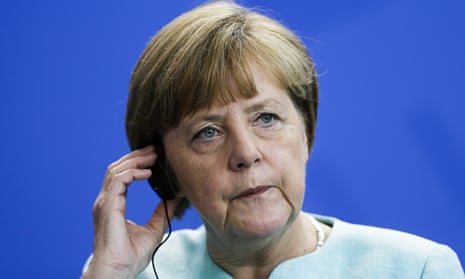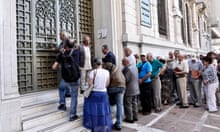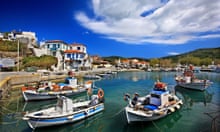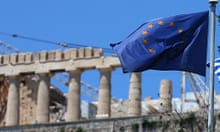Angela Merkel is like Herbert Asquith. When he was prime minister a hundred years ago, everyone was awed by him but nobody knew what he wanted. “Wait and see,” he said. His favourite word was “veiled”.
Like him, Merkel picks up other people’s policies and she puts them down again; she procrastinates; her real intentions, if any, are “veiled”. Nobody likes meeting her calm, disconcerting stare.
But, in practice, the Asquith formula sucks. Europe’s Greek disaster – for that’s what it is – proves it vividly. In Asquith’s case, “wait and see” meant that Ireland had to wait 40 years for home rule and saw partition, civil war and another half-century of intermittent bloodshed. Merkel and her finance minister, Wolfgang Schäuble, put off the rescue of Greece for years. Now they pretend not to notice that the German-inspired bailout conditions are unfulfillable (by simple napkin-scribbled arithmetic). Their Asquithery has turned a eurozone debt problem into a continental moment of fate.
With the International Monetary Fund’s memorandum, leaked to the world last Monday, a big bell began to toll for Europe. It wasn’t a funeral bell, more of a school summons. It called on the nations of Europe to be quiet for a moment and learn what they can and can’t do together. Nobody doubts that the US stands behind the IMF – and may even have arranged the leak. And nobody doubts that the eurozone leaders had read the IMF memorandum, demonstrating that the demands they were about to impose on Greece could only make the Greek debt crisis worse. But then they went ahead and imposed them. Europe, adopt the brace position!
This will be the second sore lesson in Europe’s limitations. The first came in 1991 with the Yugoslav wars. Few people remember Jacques Poos, the Luxembourger who found himself at the head of the European council. As the slaughter spread, Poos stepped forward. Stand aside, he told the world. “The hour of Europe has dawned!”
Hour of impotence, it transpired. Nobody in Belgrade or Pale or Zagreb paid any attention. The smoke of burning villages blackened the sky and the corpses floated down the Drina. “Europe’s hour” ended at Srebrenica or, more accurately, when Nato and the Americans finally had to send warplanes against the Bosnian Serbs.
That was the first lesson. Europe, as community or union, is never going to be any good at using military or political force. There are tough soldiers in many of its countries. There is even a tiny “European army” unit. But if an army is to be any use, it has to have a political command able to make rapid, unambiguous decisions. Europe doesn’t do them and there’s no prospect that it will. Much the same can be said of the common external and security policy. Its German acronym is Gasp, a nice account of the EU’s slow, chaotic reactions to the crisis in Ukraine. No, as long as the EU retains its present form, its protection will depend on US military power.
Now we have the second lesson. The European Union can’t handle a major economic emergency either. Here again, the US (standing behind the IMF) is reluctantly preparing to clear up the mess that the EU and the eurozone have created. Merkel seems at first to have hoped that Greece could provide another “Europe’s hour”. But then, to the surprise and annoyance of some of her colleagues, she tried to be cunning by involving the IMF not only in the “troika” advising the Greek government but in imposing last weekend’s “settlement”. That has now backfired with a blast that will be remembered as long as her reputation. The IMF spat the settlement out.
There are plenty of reasons for this car-crash. One, obviously, is the flawed design of the eurozone. Another is lack of imagination in the EU commission (bright juniors put down by agile Euro-mediocrities). The third reason is German tunnel vision: an inability shared by people and politicians to empathise with outsiders. In Berlin last week, old leftwing friends were as contemptuous of Alexis Tsipras (“liar!”) as they were of Merkel. One sneered: “Without German holidaymakers, Greece wouldn’t exist.”
The final reason is the enduring grip of neoliberal dogma on European leaders and bankers. Despite the 2007-08 crash, deficit reduction and balanced budgets remain fetishes, to be placated through reduced living standards and privatisations. Fear and loathing of “socialism”, and determination to capsize Syriza, drives several eurozone governments – not only Germany. So there re-emerges a deadly danger to Europe: that social-democrat and centre-left opinion begins to slide back to the suspicions of our grandfathers: “It’s just a capitalist plot, a rightwing alliance of big business against ordinary working people.”
Horror at what’s being done to Greece is already affecting British voting intentions for the EU referendum. But the postwar community was never a conservative plot. With a moderate social-democrat ideology, it presided over 30 miraculous years in which prosperity, security, health and equality all increased. Sure, it was technocratic, not democratic. The founders couldn’t wait until a “European people” existed. But their purpose is misunderstood.
Jean Monnet and Robert Schuman were not out to “transcend the nation state”. Just the opposite. They wanted to reconstruct the “legitimacy” of nation states morally, politically and economically bankrupted by war and occupation. And the only way to restore that authority was through shared supra-national institutions.
There are other misunderstandings. The cost of the common programmes (coal and steel, agriculture, fisheries) was borne by the member nations, not by the community. “Making war impossible” was realised less by Brussels than by the cold war and American power. The huge stride towards integration taken by the Maastricht treaty in 1992 was about national priorities, not superstate dreams. In a rare stroke of vision, chancellor Helmut Kohl saw that if the enormous power of a reunified Germany was to be accepted in Europe, it had to surrender sovereignty – including the beloved deutschmark.
The union will survive – as a confederation of nations, not a superstate. Some of those nations will pool more of their sovereignty, as long as that reinforces their own authority. A common currency will survive – but only by shrinking its zone to a core of similar economies which can form a single tax system (a peripheral, looser monetary union for the others).
Think of this EU as an enormous, soft, rich sponge. It will be ill-defined, its pores home to a multitude of big and small creatures whose common will emerges indistinctly, through clouds of bubbles. Swarms of small fry will rush to feed in its crevices. It will be beautiful but vulnerable: it needs the great shark America to frighten off its predators.
History has seen polities like that: common homes which didn’t regiment their inhabitants. They didn’t win wars but they radiated tolerance, culture and sometimes prosperity.
The reappearance of assertive nations isn’t the problem: they were always there. Our Europe began when nation states combined to ensure that each could create public good for its own people. But it follows that when market idolatry replaces the very notion of a collective public good, our beloved sponge will fall apart, blacken and die.








